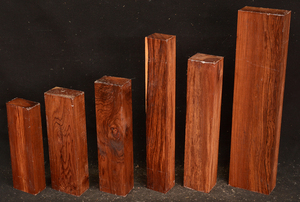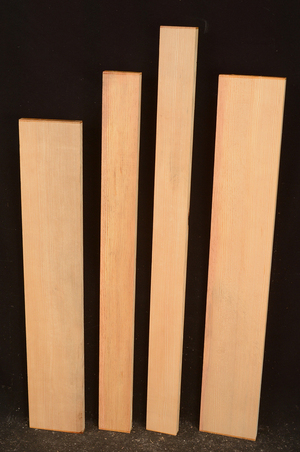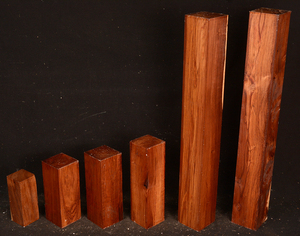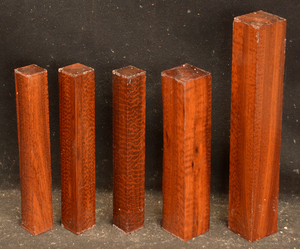Brazilian Bloodwood
Brosimum paraense
Also called Satine, Cacique, and Cardinalwood. The heartwood is a rich strawberry red, in sharp contrast to the light colored sapwood. Takes a high, lustrous finish.
Item Number: W42499
Brazilian Bloodwood Turning Squares
Brosimum paraense
Also called Satine, Cacique, and Cardinalwood. The heartwood is a rich strawberry red, in sharp contrast to the light colored sapwood. Takes a high, lustrous finish.
Item Number: W42497
Brazilian Bloodwood Turning Squares/Pool Cue Blanks
Brosimum paraense
Also called Satine, Cacique, and Cardinalwood. The heartwood is a rich strawberry red, in sharp contrast to the light colored sapwood. Takes a high, lustrous finish.
Item Number: W42496
Honduras Rosewood
Dalbergia stevensonii
A true rosewood, most of our stock comes from Belize. Smelling like stored apples, it is a lovely wood to turn and takes a fantastic polish. Getting scarce on the world market.
Due to CITES regulations, we can only ship this species to customers in the United States.
Item Number: W42488
Honduras Rosewood Turning Squares
Dalbergia stevensonii
A true rosewood, most of our stock comes from Belize. Smelling like stored apples, it is a lovely wood to turn and takes a fantastic polish. Getting scarce on the world market.
Due to CITES regulations, we can only ship this species to customers in the United States.
Item Number: W42485
Honduras Rosewood
Dalbergia stevensonii
A true rosewood, most of our stock comes from Belize. Smelling like stored apples, it is a lovely wood to turn and takes a fantastic polish. Getting scarce on the world market.
Due to CITES regulations, we can only ship this species to customers in the United States.
Item Number: W42484
Santos Rosewood Guitar Finger Boards
Machaerium sp.
This wood has gained in popularity since the early 1990's when Brazilian Rosewood was designated an endangered species. Furniture manufacturers used it as a Brazilian Rosewood substitute but it stands on its own as an instrument tone wood.
These are extremely old stock, 30-35 years old.
Item Number: IW36641
Ponderosa Pine
Item Number: W42464
German Black Locust
Item Number: W42462
German Black Locust
Item Number: W42461
German Black Locust Turning Squares
Item Number: W42460
German Black Locust Turning Squares
Item Number: W42459
German Black Locust Turning Squares
Item Number: W42458
German Black Locust
Item Number: W42457
West African Ebony Turning Squares Bundles
Diospyros crassiflora
Sometimes called Gabon or Gaboon, this Ebony is sometimes jet black but oftentimes has grayish streaks that mostly disappear when finished or after the made object has been put into service. This Ebony has a marked resistance to checking that is characteristic of some of the Indian and Asian species. It has a wonderful texture and is easily carved, planed, turned, and milled. It is fairly fine-grained and takes a high polish. This Ebony usually originates in either Cameroon or Nigeria and the logs are rough hewn in the forest and oftentimes brought to the nearest road by human porters. With the disappearance of other species of black Ebony this species is fast becoming the Ebony of choice.
A has 3 pieces.
B through F all have 4 pieces each.
Item Number: W42456
West African Ebony Turning Squares
Diospyros crassiflora
Sometimes called Gabon or Gaboon, this Ebony is sometimes jet black but oftentimes has grayish streaks that mostly disappear when finished or after the made object has been put into service. This Ebony has a marked resistance to checking that is characteristic of some of the Indian and Asian species. It has a wonderful texture and is easily carved, planed, turned, and milled. It is fairly fine-grained and takes a high polish. This Ebony usually originates in either Cameroon or Nigeria and the logs are rough hewn in the forest and oftentimes brought to the nearest road by human porters. With the disappearance of other species of black Ebony this species is fast becoming the Ebony of choice.
Item Number: W42453
West African Ebony
Diospyros crassiflora
Sometimes called Gabon or Gaboon, this Ebony is sometimes jet black but oftentimes has grayish streaks that mostly disappear when finished or after the made object has been put into service. This Ebony has a marked resistance to checking that is characteristic of some of the Indian and Asian species. It has a wonderful texture and is easily carved, planed, turned, and milled. It is fairly fine-grained and takes a high polish. This Ebony usually originates in either Cameroon or Nigeria and the logs are rough hewn in the forest and oftentimes brought to the nearest road by human porters. With the disappearance of other species of black Ebony this species is fast becoming the Ebony of choice.
Item Number: W42451
Honduras Rosewood Turning Squares
Dalbergia spruceana
This is a fairly rare species from the Amazon region of Brazil. The heartwood varies from a golden-brown to a reddish-brown often with narrow, dark stripes. It is hard and heavy, but easy to work, and takes a high polish.
Due to CITES regulations, we can only ship this species to customers in the United States.
Item Number: W42449
Honduras Rosewood Turning Squares
Dalbergia spruceana
This is a fairly rare species from the Amazon region of Brazil. The heartwood varies from a golden-brown to a reddish-brown often with narrow, dark stripes. It is hard and heavy, but easy to work, and takes a high polish.
Due to CITES regulations, we can only ship this species to customers in the United States.
Item Number: W42448
Honduras Rosewood
Dalbergia stevensonii
A true rosewood, most of our stock comes from Belize. Smelling like stored apples, it is a lovely wood to turn and takes a fantastic polish. Getting scarce on the world market.
Due to CITES regulations, we can only ship this species to customers in the United States.
Item Number: W42447
Chakte-viga Turning Squares
Guilandina sp.
Found in the Yucatan Peninsula in Mexico and related to Pernambuco (Guilandina echinata). It is sought after for house posts in Mexico as it is said to be impervious to termites and other insect pests. It is a lovely light to dark orange color, is fairly hard and heavy, and is capable of taking a very high polish. Rare.
Item Number: W42439
Chakte-viga Turning Squares
Guilandina sp.
Found in the Yucatan Peninsula in Mexico and related to Pernambuco (Guilandina echinata). It is sought after for house posts in Mexico as it is said to be impervious to termites and other insect pests. It is a lovely light to dark orange color, is fairly hard and heavy, and is capable of taking a very high polish. Rare.
Item Number: W42438
African Blackwood Guitar Bridge Blanks
Dalbergia melanoxylon
The heartwood is purplish to brownish-black with dark gray streaks giving an overall impression of being black. Lustrous with an attractive inner chatoyance. Very hard, heavy, close-grained, and virtually free from pores. Its stability and lovely tonal qualities make it an excellent instrument wood.
Due to CITES regulations, we can only ship this species to customers in the United States.
Item Number: IW36619
Bird's-eye Maple
Acer saccharum
The heartwood is white or cream to light brown or reddish brown. Figured somewhat like that of burl with many small eyes separate from each other. Hard and heavy, 45 lbs/cu ft. Easy to work and takes a smooth polish. U.S.A.
Item Number: W42412
Bird's-eye Maple
Acer saccharum
The heartwood is white or cream to light brown or reddish brown. Figured somewhat like that of burl with many small eyes separate from each other. Hard and heavy, 45 lbs/cu ft. Easy to work and takes a smooth polish. U.S.A.
Item Number: W42411
Pink Ivory Turning Squares
Berchemia zeyheri
A fairly rare wood from Southern Africa ranging in color from light pink to watermelon red. At one time it was described as being "rarer than diamonds". It is very dense, hard and heavy and takes a very high polish. Beautiful for turnery, inlays and other precious items.
Item Number: W42402
Pink Ivory
Berchemia zeyheri
A fairly rare wood from Southern Africa ranging in color from light pink to watermelon red. At one time it was described as being "rarer than diamonds". It is very dense, hard and heavy and takes a very high polish. Beautiful for turnery, inlays and other precious items.
Item Number: W42400
Pink Ivory
Berchemia zeyheri
A fairly rare wood from Southern Africa ranging in color from light pink to watermelon red. At one time it was described as being "rarer than diamonds". It is very dense, hard and heavy and takes a very high polish. Beautiful for turnery, inlays and other precious items.
Item Number: W42399
Pink Ivory
Berchemia zeyheri
A fairly rare wood from Southern Africa ranging in color from light pink to watermelon red. At one time it was described as being "rarer than diamonds". It is very dense, hard and heavy and takes a very high polish. Beautiful for turnery, inlays and other precious items.
Item Number: W42398
Honduras Rosewood Turning Squares
Dalbergia stevensonii
A true rosewood, most of our stock comes from Belize. Smelling like stored apples, it is a lovely wood to turn and takes a fantastic polish. Getting scarce on the world market.
Due to CITES regulations, we can only ship this species to customers in the United States.
Item Number: W42395
African Blackwood Guitar Bridge Blanks
Dalbergia melanoxylon
The heartwood is purplish to brownish-black with dark gray streaks giving an overall impression of being black. Lustrous with an attractive inner chatoyance. Very hard, heavy, close-grained, and virtually free from pores. Its stability and lovely tonal qualities make it an excellent instrument wood.
Due to CITES regulations, we can only ship this species to customers in the United States.
Item Number: IW36603
Guatemalan Rosewood
Dalbergia tucarensis
This Rosewood species has a reddish-brown to dark brown colored heartwood contrasting the almost white sapwood. The dust has a sweet odor. It is an excellent furniture/case works/jewelry box wood and even though it has a medium texture it does take a nice polish. We also offer it as a musical instrument wood (see guitar fingerboards and backs & sides elsewhere on the site). It has a very "crisp" tap tone with good sustain.
Due to CITES regulations, we can only ship this species to customers in the United States.
Item Number: W42391
Guanacaste
Item Number: W42387
Katalox
Swartzia cubensis
This is a large tree 2-4' diameter, by up to 120' tall from Mexico & Central America. The wood is very dense and fairly fine-grained. Because of its hardness it can be difficult to work but it takes a fine polish. Its dark color leads some to call it Mexican Ebano and very dark pieces can be used as a substitute for true black Ebony, especially in laminations and inlays. Straight-grained wood can be used for musical instrument fingerboards and bridge blanks.
Item Number: W42385
Figured Narra Turning Squares/Pool Cue Blanks
Pterocarpus indicus
Also called New Guinea Rosewood. It is a beautiful, highly lustrous golden yellow color sometimes with reddish streaks. A nice turning wood it is also used in furniture, jewelry boxes, handles, etc. It is easy to work and glue and takes a nice polish.
Item Number: W42370
Figured Red Narra Turning Squares
Pterocarpus indicus
Also called New Guinea Rosewood. It is a beautiful, highly lustrous golden yellow color sometimes with reddish streaks. A nice turning wood it is also used in furniture, jewelry boxes, handles, etc. It is easy to work and glue and takes a nice polish.
Item Number: W42369
Figured Red Narra Turning Squares
Pterocarpus indicus
Also called New Guinea Rosewood. It is a beautiful, highly lustrous golden yellow color sometimes with reddish streaks. A nice turning wood it is also used in furniture, jewelry boxes, handles, etc. It is easy to work and glue and takes a nice polish.
Item Number: W42366
Shihuahuaco
Item Number: W42357
Guatemalan Rosewood
Dalbergia tucarensis
This Rosewood species has a reddish-brown to dark brown colored heartwood contrasting the almost white sapwood. The dust has a sweet odor. It is an excellent furniture/case works/jewelry box wood and even though it has a medium texture it does take a nice polish. We also offer it as a musical instrument wood (see guitar fingerboards and backs & sides elsewhere on the site). It has a very "crisp" tap tone with good sustain.
Due to CITES regulations, we can only ship this species to customers in the United States.
Item Number: W42353
Snakewood
Piratinera guianensis
Also called Letterwood and Leopardwood. Color: dark red to reddish brown with irregular black speckles or stripes. Fine textured and highly lustrous. Very hard and heavy, 75-84 lbs/cu ft. Takes a beautiful finish. Very rare and very expensive. Guyana and Surinam.
Item Number: W42349
Snakewood
Piratinera guianensis
Also called Letterwood and Leopardwood. Color: dark red to reddish brown with irregular black speckles or stripes. Fine textured and highly lustrous. Very hard and heavy, 75-84 lbs/cu ft. Takes a beautiful finish. Very rare and very expensive. Guyana and Surinam.
Item Number: W42348
Snakewood
Piratinera guianensis
Also called Letterwood and Leopardwood. Color: dark red to reddish brown with irregular black speckles or stripes. Fine textured and highly lustrous. Very hard and heavy, 75-84 lbs/cu ft. Takes a beautiful finish. Very rare and very expensive. Guyana and Surinam.
Item Number: W42347
Snakewood Turning Squares
Piratinera guianensis
Also called Letterwood and Leopardwood. Color: dark red to reddish brown with irregular black speckles or stripes. Fine textured and highly lustrous. Very hard and heavy, 75-84 lbs/cu ft. Takes a beautiful finish. Very rare and very expensive. Guyana and Surinam.
Item Number: W42343
Snakewood Turning Squares
Piratinera guianensis
Also called Letterwood and Leopardwood. Color: dark red to reddish brown with irregular black speckles or stripes. Fine textured and highly lustrous. Very hard and heavy, 75-84 lbs/cu ft. Takes a beautiful finish. Very rare and very expensive. Guyana and Surinam.
Item Number: W42342
Ziricote Thins
Cordia dodecandra
Ziricote is another timber we get from the Yucatan Peninsula of Mexico. It is a lovely wood with a very pronounced ray fleck on radial surfaces sometimes producing a "landscape" effect much like picture jasper.
Item Number: W42341
Chakte-viga Turning Squares
Guilandina sp.
Found in the Yucatan Peninsula in Mexico and related to Pernambuco (Guilandina echinata). It is sought after for house posts in Mexico as it is said to be impervious to termites and other insect pests. It is a lovely light to dark orange color, is fairly hard and heavy, and is capable of taking a very high polish. Rare.
Item Number: W42338
Chakte-viga Turning Squares
Guilandina sp.
Found in the Yucatan Peninsula in Mexico and related to Pernambuco (Guilandina echinata). It is sought after for house posts in Mexico as it is said to be impervious to termites and other insect pests. It is a lovely light to dark orange color, is fairly hard and heavy, and is capable of taking a very high polish. Rare.
Item Number: W42337
Ziricote
Cordia dodecandra
Ziricote is another timber we get from the Yucatan Peninsula of Mexico. It is a lovely wood with a very pronounced ray fleck on radial surfaces sometimes producing a "landscape" effect much like picture jasper.
Item Number: W42334
Ziricote Turning Squares
Cordia dodecandra
Ziricote is another timber we get from the Yucatan Peninsula of Mexico. It is a lovely wood with a very pronounced ray fleck on radial surfaces sometimes producing a "landscape" effect much like picture jasper.
Item Number: W42333
Honduras Rosewood
Dalbergia stevensonii
A true rosewood, most of our stock comes from Belize. Smelling like stored apples, it is a lovely wood to turn and takes a fantastic polish. Getting scarce on the world market.
Due to CITES regulations, we can only ship this species to customers in the United States.
Item Number: W42331
































































































